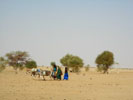
On Friday, the United Nations took an important step in recognizing an obvious but nonetheless crucial fact about Sudan’s upcoming elections: the people of Darfur may not be able to vote in their country’s elections because of a dispute over the recent national census and because of large-scale displacement of Darfuris due to the ongoing conflict.
As Enough argued in a recent strategy paper, Sudan’s upcoming national election poses a series of thorny questions for the international community. To date, these questions have not been acceptably resolved. A key question is:
How can a credible election take place in Darfur at a time when the international community is struggling to maintain even bare minimum levels of lifesaving aid there and more than 3 million people are still internally displaced or refugees?
Alain Le Roy, head of the U.N.’s Department of Peacekeeping Operations, acknowledged that although the security situation in Darfur has improved, “enormous risks” remain. Le Roy noted that in addition to the challenges of registering displaced voters and addressing the census controversy regarding the population of Darfur, the volatile area of Darfur bordering Chad—particularly in West Darfur, where the Sudanese government has accused Chad’s armed forces of launching air raids in recent weeks—is too unstable to support the holding of elections.
Le Roy reportedly did not mince words, arguing that the results of the Sudanese elections would have an "enormous impact on the political dynamics within Darfur’s displaced persons camps."
These frank words did not sit well with the Sudanese government in Khartoum. The spokesperson of Sudan’s Foreign Affairs Ministry, Ambassador Ali Al-Sadiq, rejected Le Roy’s remarks, saying that Sudan’s National Election Commission is administered by experienced and competent members, and is the only body mandated to make decision on election affairs in Sudan. In other words, Sudan responded to the U.N. by saying, “stay out of this.”
The U.N. should be congratulated for beginning a more public and more frank discussion of the myriad challenges plaguing the electoral process in Sudan. As the clock ticks closer to the elections, these challenges will only become more urgent. Coordinated efforts by the international community to develop a multilateral strategy to keep the elections on track and to urge key reforms by the Sudanese government before the elections are essential not only to keeping the Comprehensive Peace Agreement on track, but also to ensuring that the elections do not take Sudan off of the path toward democratic governance.

